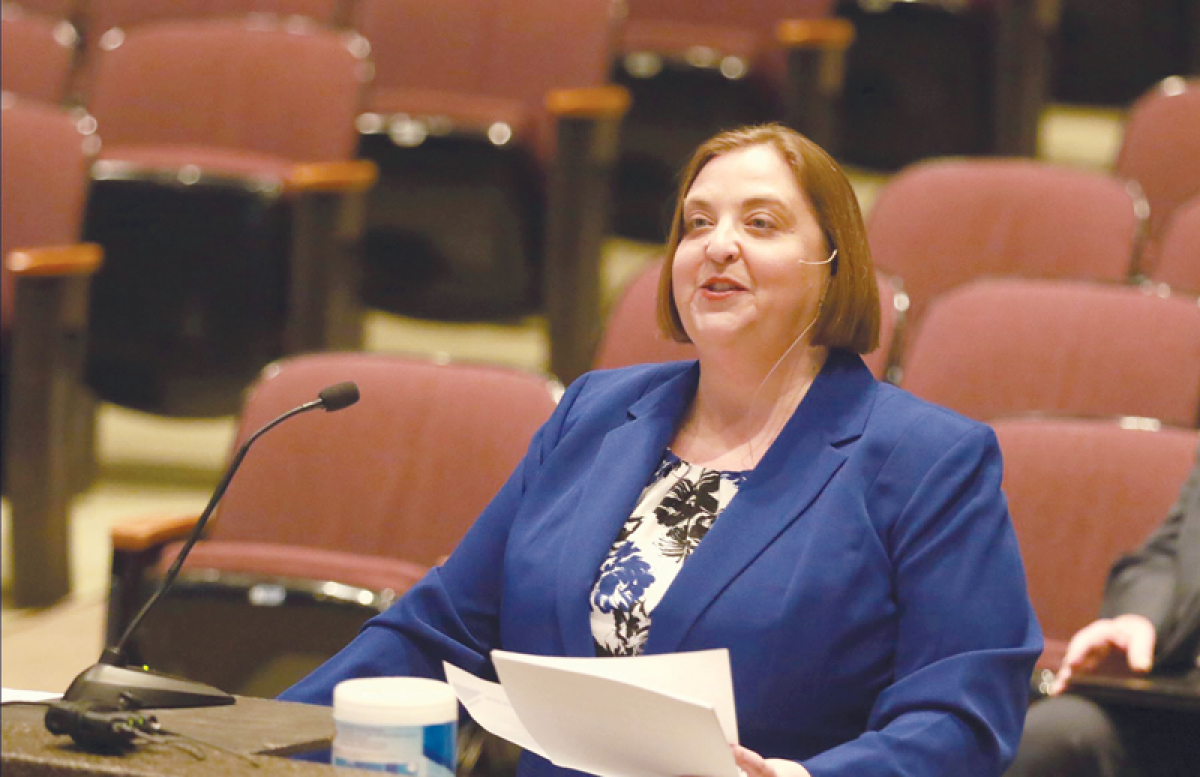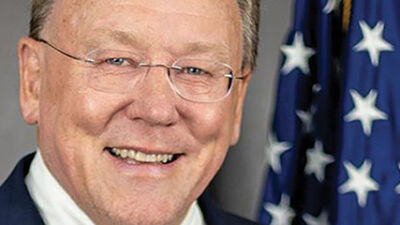WARREN — Mayor Lori Stone gave her first budget presentation on April 8 at the Warren Community Center’s auditorium before nearly 200 in attendance. Those gathered included one councilman, residents, city department heads and members of the media.
Stone discussed revenue, expenditures, Warren’s workforce, infrastructure and more.
Revenue and expenditures
“With all the revenue sources of the city totaled, the city budget proposed is $351.4 million dollars,” said Stone. “I bring you the fiscally responsible balanced budget for your consideration.”
Stone started the budget presentation by discussing the city’s revenue, which she defined as expected income. According to the mayor, the general fund revenues are expected to total $158,242,078.
“Warren can only spend the money it has and when it’s gone it’s gone,” she said.
Warren property taxes and state shared revenue make up 78.8% of the general fund, according to the mayor. The additional 22.2% is expected to come from building inspection fees, which are expected to generate more than $6 million, and rental inspections generating $1.2 million. Other revenue is generated by fees for licenses, permits, charges for services, fines, forfeitures and interest earned on investments.
The mayor then discussed the other side of a balanced budget — expenditures.
“As mayor, I am committed to being a good steward of tax dollars. I will carefully implement the budget that the City Council adopts to ensure that every dollar spent each year will maintain the same high level of city services that Warren residents deserve,” Stone said.
Warren’s workforce
Warren’s workforce is paid from the general fund. Employee wages make up 41.7%, and benefits comprise 36.7%.
The bulk of the workforce is public safety at 55%. Those are police officers, dispatchers, firefighters, paramedics and animal control officers. General government workers make up 20% of Warren’s workforce. This includes the City Council, the clerk and treasurer’s offices, the 37th District Court, legal staff, the assessing and human resources departments, and others. The libraries, sanitation, rental division, parks and recreation, communications, the Downtown Development Authority, and Tax Increment Finance Authority staff make up 15%. Public works amounts for 10% of the workforce, which includes engineering, building, the Department of Public Works, building maintenance and planning.
“In tight labor markets, it is important to remember when unemployment has been under 4.2% for more than two years, the city of Warren is competing with other communities for civil service positions, as well as private businesses for workforce capital,” Stone said. “In order to recruit, attract and maintain workforce capital, the city of Warren must offer competitive wages, as well as benefits.
“I’m going to use this opportunity to plug some of the city’s positions in the city of Warren that are still hiring, everything from engineers to inspectors, lifeguards to umpires,” Stone said.
Infrastructure
With climate change, the region is experiencing rainfall more frequently, according to the mayor. As a result, she is seeking infrastructure improvements to hold the water and prevent flooding.
“The detention basin will pump 21.5 million gallons (of water), diverting water from an overburdened system to a holding facility,” she said.
Stone said she plans to bring more state and federal money to Warren.
“I’m committed to seeking additional sources of revenue to help taxpayer dollars go farther, by applying for congressionally directed funding, requesting additional state appropriations, and applying for grant dollars to increase investment in policy priorities,” Stone said.
To balance the budget this year, Stone proposed a water rate increase.
“I must come to you after three years without a rate increase for the water and sewer system, to request a 7.5% increase in order to be a responsible community leader. I am imploring you not to let our water system fall into disrepair from failure to fund,” the mayor said.
Budget now in the hands of the City Council
Stone delivered her presentation about the 2024-25 fiscal year budget from the floor of the auditorium, at the lectern facing the stage where freshman City Councilman Henry Newnan was the only one seated, leaving her back to the rest of the audience.
According to Newnan, residents later wanted to know why more council members were not there.
“It wasn’t a City Council scheduled event. We’re not a City Council unless we schedule an event and post it because of the Open Meetings Act,” Newnan said. “And there are things we can do and there are things we can’t do, and that was one of the things we really couldn’t do.”
The most senior member of the Warren City Council, Council Secretary Mindy Moore, said, “Budget presentations are done during a City Council meeting or the hour before the meeting. That is not a council meeting.”
According to Newnan, if other council members could have made the presentation, they would have.
“Everybody was well intentioned. I don’t believe anybody was boycotting the event. It’s just they had other things they had already planned by the time the mayor had decided to call a meeting,” Newnan said.
According to the mayor, all elected members of the City Council and Deputy City Council Secretary Mary Kamp were invited to the presentation via email on April 3 for the April 8 presentation. As part of her duties, Kamp schedules events for the City Council.
Warren’s city charter states the administration must present the budget to the council by the second Monday in April, which was April 8. Although some council members thought it would be during business hours, the administration noted the charter makes no such requirement.
The mayor addressed that at the beginning of her presentation.
“The city charter language is clear, concise and prescriptive. It does not specify the time of day,” Stone said. “The city charter simply requires the administration to provide the second Monday in April each year to the City Council with the proposed budget. This year, 2024, the second Monday is April 8.
“My experience with the state legislature, the manner in which the executive, and for our purposes, the mayor, presents the budget is at the discretion of the administration,” Stone added.
According to Newnan, he received a hard copy of the nearly 300-page budget document when he arrived at the meeting. He and the other council members received a digital copy via email that evening after the mayor’s presentation.
“This is just a presentation. After this, we will have a review with (the) council,” Warren Communications Director Clarissa Cayton said. “Each department will actually meet with (the) council to discuss in further detail the ins and outs of the budget.”
The council was scheduled to meet with each city department, division and commission starting on April 13 to discuss their budgets.
 Publication select ▼
Publication select ▼



















